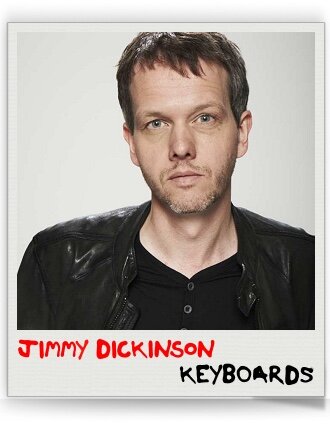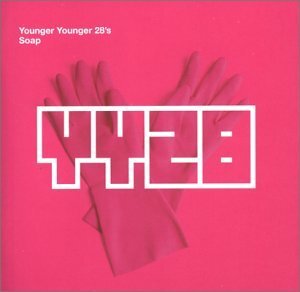URUSEI YATSURA
I was obsessed with Glaswegian indie rock as a teenager - and I loved few bands more than Urusei Yatsura. Weirdly, for someone who wrote fanzines between the ages of 15 and now, I never interviewed them. Never asked them what their favourite Sanrio character was. Never asked them what their favourite flavour of lollypop was. Man, the late nineties fanzine scene was a strange place.
Excellent band. Excellent songs. Forever missed. Here’s a wee chat with guitarist and vocalist Graham Kemp (pictured below with daughter Freya).
(Oh yeah, when you’re done, why not listen to a minute of John Peel saying ‘Urusei Yatsura’ over and over again?)
Shall we start at the beginning? How did four kids from Glasgow come to be so well versed in noisy indie rock?
“I met Fergus [Lawrie, vocals and guitar] through mutual friends at Glasgow University. I worked in Tower Records and we would head out clubbing after my shift finished at midnight. We met Elaine [Graham, bass] on a night out and Fergus dared her to play bass for us. Then Ian [Graham, drums] got dragged into it when one of our revolving cast of drummers didn't turn up to a night out at the 13th Note and he happened to be there. His expertise in classical guitar made him ideal for the position. Anyway, he did great and we then had a sibling rhythm section, which more bands should think about in my opinion. Me and Fergus were both obsessed with Galaxie 500 and formed a band to cover their songs, but they turned out to be too difficult to play and so we had to write some of our own. We all bonded by being at least half of the crowd at Glasgow shows for bands like Archers Of Loaf and Radial Spangle.”
Radial Spangle! I really should try to speak to them for ‘Indie Heaven’. So I never knew that Alex Kapranos - later of Franz Ferdinand - hosted that comp that your very early song 'Guitars Are Boring' appeared on…
“Alex ran the Kazoo Club night in the 13th Note. It was kind of a riot in that any thrown together band could play there without paying for the privilege. The idea was to fill the place up on a Tuesday and pretty much anything could happen, like us playing impromptu sets with someone who had never played drums before but fancied a shot. It was the opposite of cool. Alex put on a festival of his favourite Tuesday night bands one week in 1993 and it got recorded on a mobile unit for a live record [1994’s Kazoo Collection] that he put out on his own label. I handed a copy of that record to John Peel when I went along to be interviewed about our Kitten Frenzy fanzine when he did his show from Glasgow. He slapped it on and played our song there and then, unfortunately at the right speed. It took us ages to sell all our share of the album, but it did start the process of us getting signed. Alex was always very helpful and encouraging to the shambolic bands that hung out at the club. A real gentleman enthusiast.”
One of the things I loved about Urusei as a teenager was how you opened up a world to me - comics, weird toys, Japanese culture, films… Was that conscious, or just a product of you all being really into stuff?
“We just got obsessed with Japanese culture and US indie bands and thought we could mix them up. I think the band name ended up being chosen when we asked ourselves what would be the most stupid thing to call ourselves, and we were goaded by Peter Bagge's comment about bands that were named after comics being losers. Was it silly to name our band after a massive, copyrighted manga? Yes, but consciously silly. Rumiko Takahashi was very cool about it. We just had to call ourselves Yatsura in the USA and Japan and she was okay with it. We couldn't call ourselves just ‘Urusei’ because that can mean ‘Shut the fuck up’ depending on how you write it in Japanese script. It's too complicated to explain but Japanese is a very interesting language.”
Glasgow felt like the epicentre of UK indie rock in the mid-to-late nineties. What do you think contributed to the hit rate of so many good and interesting bands? And what was the scene like to be in it? I imagine less idyllic that it appeared to a sixteen-year-old in Doncaster…
“Basically there were places to play and places to practice so everyone was in a band. It would be crazy not to be. It's always been a big music city and usually well off the beaten track for music journalists, so you can just play for a laugh and develop your sound and abilities without having to give much of a shit about ‘career’. Everyone does their own thing and as long as you don't act the rockstar you end up making friends with everybody else. It's a small enough city so you end up hanging out at the same bars and see everyone at gigs. I found an old flier the other day and we had four or five gigs just that December, so we were playing constantly before we ever went on tour. We used to promote shows around our fanzine and tried to bring different bands together. I have video of us, Spare Snare, The Delgados and Bis playing one night at Nice N Sleazy. A bunch of major label A&R guys were trying to sign Bis so we charged them double to get in.”
It was cool, towards the end of the band, seeing you inch into the national music press more and more. What was your experience of the music press at that time?
“Fanzines were great. We seemed to be constantly doing interviews. So many supportive enthusiastic people in leopard print coats! The music press were actually okay to us, but neither party really took the other seriously. I remember walking away mid-sentence at The Brat Awards because the editor of the NME was creeping me out with his coked up dead eyes.”
You even had a hit! Sort of! 'Hello Tiger'! Straight in at number 40 with a bullet…
“We were on tour and getting reports that it was top twenty midweek. Ché were getting excited and we were talking about gettting some t shirts printed with ‘41’ on the back because we were sure the most annoying let down was on the way. Of course, Ché were forgetting that it was Brits Week so everybody went out and bought everyone who had been nominated at the weekend. 40 was almost more annoying than 41 would have been. At least we forgot to order the t-shirts.”
Urusei Yatsura split up in 2001. Can you walk me through that?
“It was just played out. We would have had to rebuild after [2000’s] Everybody Loves Urusei Yatsura. Ché had a first refusal deal with Seymour Stein. They held up each of our albums for months and fucked our momentum - the major label wanks - but the band weren't working well together and rehearsals weren’t fun. I thought “fuck it” and got a job in a record shop. It would have been nice to continue doing what we always wanted, which was to release interesting records at our own pace on our own label, but the will wasn't there.”
What's the likelihood I could ever get to see Urusei play again?
“It's very unlikely. Any sort of hard feelings are pointless and unimportant after so many years, so I would never rule anything out. It would be nice to record something again but I'm sure it would be different to the stuff we made in our twenties. I wouldn't be so annoying to work with now I've mellowed the fuck out.”
That’s great, but booooo. Can you tell me a bit about how your new compilation Can You Spell Urusei Yatsura came to be?
“It's based on cassette tapes I used to make of our non-album stuff for friends. I had a few years where I just couldn't listen to anything we recorded, but one night I had a few drinks and started going through our old records and was surprised by a lot of the songs. We just recorded songs when they were ready so A side/B side was pretty arbitrary. Fergus in particular had a lot of great tunes on B sides of singles. Later when I decided to make a Bandcamp archive I decided to answer a question nobody asked. What if all those lost songs were available to make a whole new album from? I think it's a nice collection, a whole lot of random styles and sounds but they seem to make a cohesive whole which really represents what the band was about. Maybe better than the official albums, in truth.”
Okay, I’m gonna ask some real dumb questions now…
“Go for it.”
Were the lyrics to [1995 single] 'Siamese' ever forgotten? I can't imagine those were easy words to learn!
“Fergus and I wrote all those one afternoon when we were recording some stuff to help with someone's sound engineering course at college. We just wanted to celebrate all our favourite bands in Glasgow and it's just packed full of words and namedropping. I think there may have been about four pages of them initially but it got cut down considerably. I think i'll remember them long after i've forgotten how to tie my shoes.”
How many pairs of shades do you own? I don't think I've ever seen your actual eyes!
“I have never spent more than £10 for a pair of sunglasses. I had to wear them because I only ever blink when a shutter clicks. It's a shitty superpower but there we have it.”
I ask this as a nineties fanzine survivor. Was it exhausting being asked, 'what's your favourite colour?' so often?
“You would not believe. It's the sort of question that can make you doubt your sanity.”
Well, this has been nice Graham. Want to plug anything?
“People can hear our stuff on Bandcamp. We have kept most of it as pay what you like, so you know we’re not in it merely for the money, although we do a nice line in obscure nineties indie band t-shirts and apparel. There are some sessions available to listen to, also at no cost. I have a new band called Calacas and Fergus has a new band called Paper Birch. Thankyou!”































